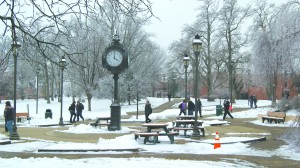Semester off to icy start
February 10, 2014
NOTE: This story is about winter 2014, though it is being shared in February 2015 to illustrate how a snow day is called.
There are two magical words that send children into a frenzy, and perhaps even ignite a similar feeling in adults as well: “snow day.”
IU Southeast has had to cancel classes twice, release students early once, and delay classes three times. Six interruptions in just the first month of classes has placed pressure on faculty and students to come up with creative ways to keep up and not fall behind.

Uric Dufrene, vice chancellor for academic affairs, said the administration is not necessarily pressuring professors to ease the workload on students or be more forgiving. He said they want faculty to be aware that some students will be affected more, but ultimately it is up to the professor to handle students on a case-by-case basis.
Rhonda Wrzenski, associate professor of political science, said the administration trusts the teachers with their classes.
“The administration kind of sees this as our terrain,” Wrzenski said. “Only we really know what’s going on in the class, and therefore we probably know the best strategy on how to deal with it.”
Dufrene said he does not make the decision to delay or cancel classes alone, but relies on information from a variety of sources.
According to the Administrative Affairs Policies and Procedures, the process starts with the chief of police. The sergeant or senior officer will notify the chief when snow begins to accumulate before campus opens. The chief and officer-in-charge together determine whether the conditions will affect faculty, staff, and students. If they think it will, they then notify the vice chancellor of academic affairs. In this case, that person is Dufrene.
Dufrene said he then begins to gather information He said he gets information from the Physical Plant regarding conditions on campus and seeks input from IU East about conditions in that region. He said he also listens to dispatch reports of accidents in the area and information from the National Weather Service. He then has a conference call with some of these sources before deciding what to do.
Once he has decided to delay or cancel classes, he gets final approval from the chancellor. Once that is given, he notifies the local media and the IUS Police. The IUS Police then notify the switchboard and within minutes, students’ phones are telling them to sleep in.
Wrzenski said she does not want students to feel frustrated and fall behind.
“I think it’s about staying positive and trying to say, ‘Look, we are all in this together,’” Wrzenski said. “Let’s try and come up with a solution that is going to work well for everyone.”
While all students have had to find ways to adjust, the challenge for some students might extend beyond campus closings alone.
Ashley Neal, sociology senior, has a one-year-old and said her daycare has been shut down six times in the last three weeks. For that reason, she has missed class in addition to the time off for snow.
Neal said she does not feel behind, but she admits that some professors are more forgiving than others.
“In one class my professor has pushed back an exam and is helping students with a detailed study guide,” Neal said. “And in another class, students who miss that day are still held responsible for the information that was covered.”

Other students living farther away face similar challenges. Noah Hewitt, criminal justice junior, said he commutes from Madison, Ind., and missed his morning classes for the first time last Wednesday.
“If you live closer to IUS, then I don’t think it’s a problem,” Hewitt said. “I know that some of the kids in the classes I missed this morning, who live farther away, weren’t there either.”
Hewitt said that despite these challenges, he has been able to make up all of his work. He said he attributes some of this to being a junior, and that he believes his experience allows him to better cope with the obstacles. He also said that his professors have been a big help.
“The teachers have been easy to get along with,” Hewitt said.


